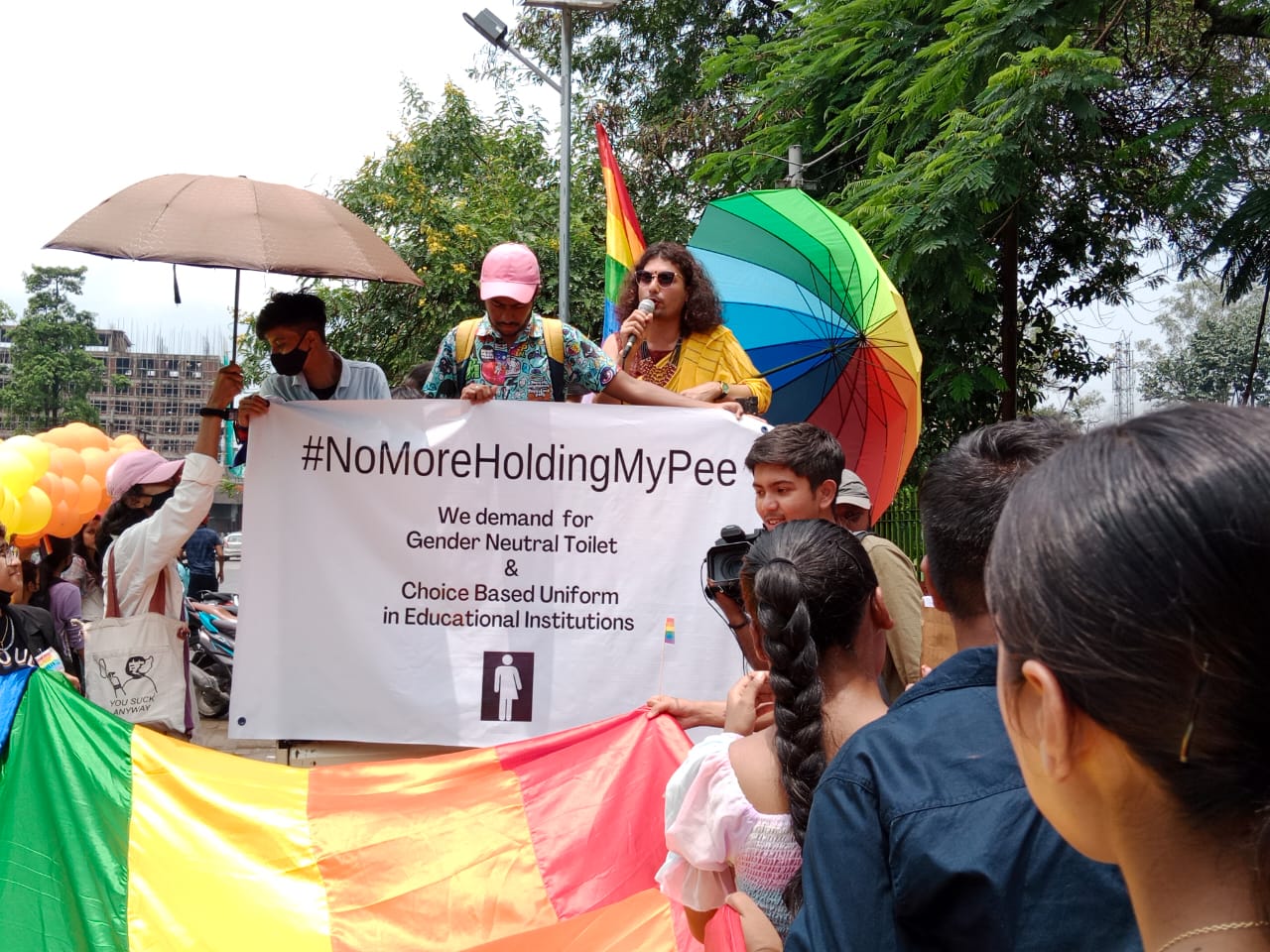Delhi: On February 5 this year, Chief Minister of Delhi Arvind Kejriwal announced that public bus transport would be free for the transgender community. “Want to give some good news,” Kejriwal began, according to a report in The Times of India. “In the last 75 years, no government in the country has done any good work for the kinnar (transgender) community. The Delhi govt is taking a big step and making it free for members of the community to travel on public buses. Like women, members of the kinnar community will get free safar (travel) in Delhi government-run buses.”
The proposal still needs to be presented to the cabinet before it is rolled out. However, Kejriwal hopes that they will launch the scheme “in the coming few weeks”.
This announcement has sparked a whirlwind of reactions from members of the transgender community. On the surface, this policy appears to be a progressive step towards empowering a marginalised community. However, a closer inspection reveals a chasm between well-intentioned rhetoric and the harsh realities faced by the capital’s transgender residents, exposing the government’s own ignorance and lack of preparedness.
Eligibility criteria poses barriers of all kinds
The policy’s restrictive eligibility criteria, which mandates possession of a transgender certificate exposes the yawning gap between performative welfare politics and driving material change for India’s ostracised transgender minority. As elections loom on the horizon, the familiar pattern of scanning disabled rights for electoral mileage continues unabated, transcending ideological lines.
Salma*, a 25-year-old trans woman, has been unable to procure her transgender certificate from the Department of Social Justice and Empowerment despite four attempts over two years. Constant rejection of applications due to discrepancies like the inability to obtain medical records or mismatching documents, meeting rigid requirements around gender transition proof, navigating complex bureaucratic processes, and dealing with prejudice or lack of understanding from administrators have debilitated her from accessing basic legal rights and services linked to the ID card. “If free bus rides become linked to this certificate, so many transgender people will be left out,” Salma laments. “We need a simple affidavit-based system instead.”

It was on February 5 that Chief Minister Arvind Kejriwal announced free public bus transport for the transgender community.
The obstacles faced by Salma echo the common bureaucratic blockade that the majority of the capital’s transgender residents fail to overcome. According to the National Portal for Transgender Persons, only 343 individuals have successfully received transgender certificates issued in Delhi so far – a mere fraction of the estimated 15,000 transgender residents lacking fundamental citizenship rights.
Anjali Mody*, who struggled for 18 months before procuring her transgender certificate, reveals how the system remains designed to be discriminatory. Officials’ expectations of quotas, randomly admitting applications, and inconsistent document requirements all compound the hardship faced by vulnerable applicants.
“Many from lower-income families cannot keep fighting this frustrating bureaucracy designed to gate-keep rights from minorities,” Anjali laments. “If policy does not reform the source process which out-powers people, then welfare schemes further down the line remain meaningless.
Also, transgender individuals often face mistreatment and harassment from bus conductors, further exacerbating the challenges they face in accessing public transportation. Anjali Mody recounts, “Often, conductors have made derogatory remarks or refused to let us board the bus. Even with this free ride scheme, if their attitudes don’t change, it will be difficult for us to truly benefit from it.”
Sonali*, a trans woman, echoes the sentiment, “The affidavit costs at least Rs 200 to Rs 400; then you need to provide address proof, identity proof, and proof of sex reassignment surgery if you want to be recognised as male or female. Then there’s a verification process where they come to your house, verify your address, and ask neighbors how long you’ve been living there. I don’t know if a lot of trans people have the money to afford the affidavit. I don’t even know if they have come out to their family or in their neighborhood to undergo the physical verification process. We are applying for the TG card so we can avail other identity proof, but how are we going to provide them with an identity card at the time of applying for the TG Card?”
Also, it’s all online. “I am a little bit educated, so I know how to use online services, but I am sure most trans people in the community wouldn’t know how to apply. And when we talk about NGOs and CBOs, it takes a lot of money to run campaigns and projects, and the government is not providing anything, so they have to manage everything by themselves, which is very difficult,” says Sonali.
Compounding the bureaucratic hurdles is the digital divide that further marginalizes the transgender community. A recent UN Women report, citing a study by the Centre for Internet and Society, reveals that digital literacy – the ability to navigate the internet, use online platforms, and access websites – is at a mere 15% among the transgender community.
This digital illiteracy creates a formidable barrier to accessing the very systems designed to grant them legal recognition and, subsequently, access to essential rights and services.
Welfare schemes and their limitations
While the Aam Aadmi Party has garnered praise for announcing the progressive policy of free bus rides, many have critiqued its paradoxical eligibility barrier. Sonali allege that the party announced the scheme for political mileage before elections, without intending meaningful impact.
Vikram*, a 28 year-old trans man who underwent gender affirmation in 2020, echoes this sentiment. Despite spending his life savings on transitioning, Vikram still does not have an ID recognising his male gender. “But the plan has no real benefit if transgender certificates remain so inaccessible,” he adds.
With the majority of potential beneficiaries excluded from availing the service, activists question its legitimacy as a “free” scheme. “If free bus rides don’t accept me as a trans person without bureaucratic hassles, how is that free?” asks Salma. “Liberty comes when the process empowers us, not disables our rights further.”
Amidst the criticism, a government official who identifies herself as a trans woman offers a perspective that cannot be ignored. “The TG certificate is not only an identity card but it is a kind of enrollment in government records,” they state. “You exist as a human being, but if you want to avail the benefits of any scheme for any special community, you need to prove that you are legally eligible.”
The authority further draws parallels with other communities, noting, “Don’t forget that even caste certificates are kept to get the benefits of government schemes. Even while filling up application forms for government jobs, one needs to provide the domicile certificate.”
Heart of the matter: Ignorance and unreadiness
However, the crux of the issue lies in the government’s own lack of understanding and preparedness. As Viveka Gurung, a trans male activist from Orissa, aptly points out, “The government doesn’t want to talk about it because they themselves are not sure about the issue. It’s a very big policy, but nobody knows the impact of it or how to handle the loopholes in it.”
The Delhi government’s failure to create public awareness about trans IDs or educate the district magistrates on the process further compounds the problem. On February 5, the Delhi transport minister told the media that the transgender certificate would be mandatory. However, according to official census data, there are only around 15,000 transgender residents in Delhi. But activists estimate that the actual transgender population is much higher, likely in the lakhs. As per data available with the National Portal for Transgender Persons, only 343 trans persons in Delhi currently have the mandated transgender certificates, and 47% of the applications for certificates are pending.
Adding to the confusion, many transgender individuals themselves are unaware of the existence of transgender certificates, let alone the complex process to obtain them. “Some transgender people don’t even have an idea what a transgender certificate is all about,” a community member notes, highlighting the lack of awareness among the community.
A call for true inclusion
As the cacophony of voices swirls, one truth emerges: true empowerment requires genuine representation, access, and equity – not PR publicity stunts that further marginalise the already marginalised. Policymakers must walk the talk by placing the rights, welfare, and autonomy of suppressed minorities before privileged institutions, point out community members.
To achieve this, governments must reform the flawed processes that deter transgender individuals from obtaining legal identification and documentation. And, only through collective action, unwavering determination, and a commitment to dismantling systemic barriers can the transgender community in Delhi, and across India, truly claim their rightful place as equal citizens, free from the shackles of discrimination and marginalisation.
As Viveka Gurung poignantly states, “I guess in this situation, it is up to us queers to steer the mass registration movement of trans folks in our region.”



